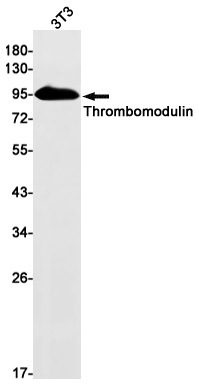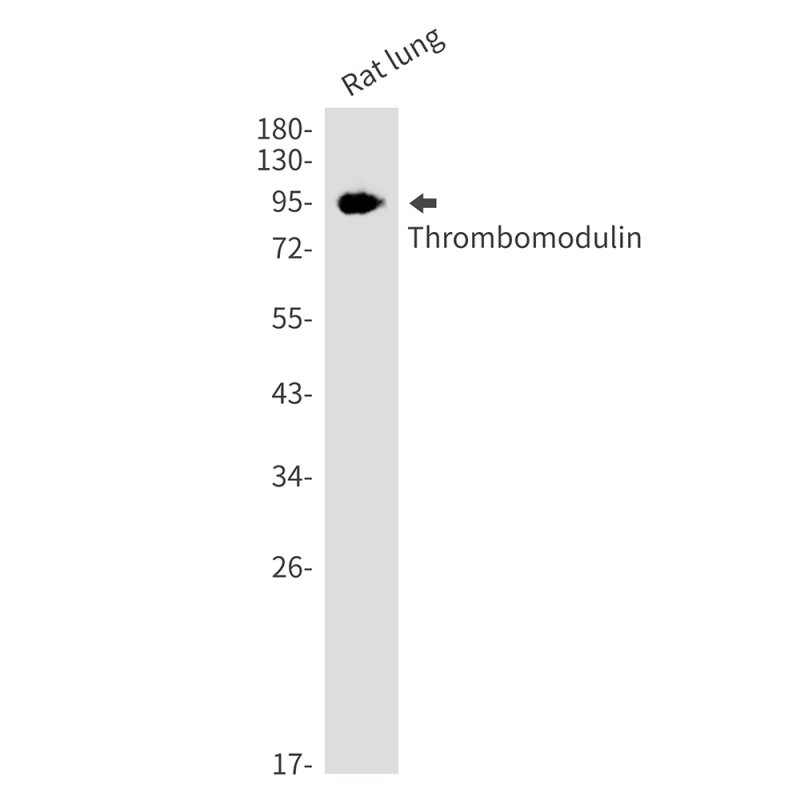

| WB | 1/500-1/1000 | Mouse,Rat |
| IF | 咨询技术 | Mouse,Rat |
| IHC | 咨询技术 | Mouse,Rat |
| ICC | 技术咨询 | Mouse,Rat |
| FCM | 咨询技术 | Mouse,Rat |
| Elisa | 咨询技术 | Mouse,Rat |
| Aliases | CD141; Fetomodulin; THBD; THRM; thrombomodulin; TM |
| Entrez GeneID | 21824 |
| WB Predicted band size | Calculated MW: 62 kDa; Observed MW: 95 kDa |
| Host/Isotype | Rabbit IgG |
| Antibody Type | Primary antibody |
| Storage | Store at 4°C short term. Aliquot and store at -20°C long term. Avoid freeze/thaw cycles. |
| Species Reactivity | Mouse,Rat |
| Immunogen | Recombinant protein of mouse Thrombomodulin |
| Formulation | Purified antibody in TBS with 0.05% sodium azide,0.05%BSA and 50% glycerol. |
+ +
以下是关于Thrombomodulin抗体的3篇参考文献及其摘要概括:
---
1. **文献名称**:*"Thrombomodulin as a marker for vascular endothelial cell injury: Application of a monoclonal antibody"*
**作者**:Suzuki K, et al.
**摘要**:该研究利用抗Thrombomodulin单克隆抗体,验证了其在检测内皮细胞损伤中的特异性。实验表明,Thrombomodulin在正常内皮细胞表面高表达,而在炎症或氧化应激条件下表达显著下降,可作为内皮损伤的生物标志物。
---
2. **文献名称**:*"Thrombomodulin in inflammation: Role of its lectin-like domain"*
**作者**:Conway EM, et al.
**摘要**:文章探讨了Thrombomodulin的凝集素样结构域在抗炎反应中的作用。通过抗体阻断实验发现,Thrombomodulin通过与HMGB1等炎症因子结合,抑制白细胞迁移和细胞因子释放,提示其抗体可用于调节炎症相关疾病。
---
3. **文献名称**:*"Expression and clinical significance of Thrombomodulin in tumor-associated vasculature"*
**作者**:Maruyama I, et al.
**摘要**:研究利用抗Thrombomodulin抗体分析肿瘤血管中的表达模式,发现其在多种实体瘤(如肺癌、结肠癌)的血管内皮中表达异常,与肿瘤进展和预后相关,为抗血管生成治疗提供了潜在靶点。
---
4. **文献名称**:*"Therapeutic potential of Thrombomodulin antibody in sepsis-induced coagulopathy"*
**作者**:Bockmeyer L, et al.
**摘要**:该研究在小鼠脓毒症模型中验证了抗Thrombomodulin抗体的治疗作用。结果显示,抗体通过恢复蛋白C活化通路,减轻凝血紊乱和器官损伤,提示其在脓毒症治疗中的应用前景。
---
这些文献覆盖了Thrombomodulin抗体在基础研究、疾病机制和治疗开发中的关键作用。如需具体期刊和年份,可进一步补充数据库检索。
Thrombomodulin (TM) is a transmembrane glycoprotein primarily expressed on the surface of vascular endothelial cells, playing a critical role in regulating coagulation, inflammation, and cellular homeostasis. It acts as a cofactor for thrombin-mediated activation of protein C, a natural anticoagulant pathway that inhibits thrombin generation and promotes fibrinolysis. TM also interacts with thrombin to modulate complement activation, cell adhesion, and inflammatory responses. Dysregulation of TM expression or function is implicated in thrombotic disorders, sepsis, cancer progression, and vascular pathologies.
Antibodies targeting thrombomodulin are essential tools for studying its expression, localization, and functional roles in both physiological and pathological contexts. These antibodies are widely used in techniques such as immunohistochemistry (IHC), Western blotting, flow cytometry, and immunofluorescence to detect TM in endothelial cells, platelets, or soluble forms in plasma. Researchers utilize TM antibodies to investigate endothelial dysfunction in diseases like atherosclerosis, diabetes, or COVID-19-associated coagulopathy. Additionally, they aid in exploring TM's dual role in cancer, where it may either suppress metastasis by maintaining vascular integrity or promote tumor growth through anti-inflammatory signaling. Monoclonal and polyclonal TM antibodies vary in species reactivity (human, mouse, rat) and epitope specificity, enabling tailored experimental designs. Validation of TM antibodies includes assessing binding affinity, cross-reactivity, and performance in specific assays, ensuring reliability in translational research and diagnostic applications.
×